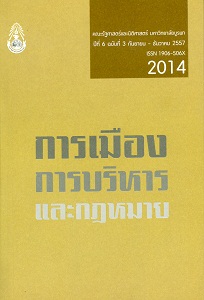การปฏิบัติตามหลักธรรมาภิบาลของราชการส่วนภูมิภาค ในจังหวัดนครราชสีมา
Keywords:
การปฏิบัติ, ธรรมาภิบาล, ราชการส่วนภูมิภาค, Implementation, Good governance, Provincial administrationAbstract
การวิจัยนี้มีวัตถุประสงค์เพื่อศึกษาระดับการปฏิบัติตามหลักธรรมาภิบาลความสัมพันธ์การปฏิบัติตามหลักธรรมาภิบาลปัจจัยที่ส่งผลต่อการปฏิบัติตามหลักธรรมาภิบาลและเพื่อศึกษาปัญหาอุปสรรค ตลอดจนเสนอแนวทางในการพัฒนาการปฏิบัติตามหลักธรรมาภิบาลของราชการส่วนภูมิภาค เครื่องมือวิจัยเป็นแบบสอบถามกลุ่มตัวอย่าง จำนวน 312 คน และแบบสัมภาษณ์ผู้ให้ข้อมูลหลักจำนวน 9 คน สถิติที่ใช้ในการวิเคราะห์ ได้แก่ ค่าเฉลี่ย ค่าส่วนเบี่ยงเบนมาตรฐาน วิเคราะห์สัมประสิทธิ์สหสัมพันธ์แบบ เพียร์สันและการวิเคราะห์ถดถอยพหุคูณ ผลการศึกษาพบว่า ราชการส่วนภูมิภาคในจังหวัดนครราชสีมามีผลการปฏิบัติงานโดยใช้หลักธรรมาภิบาลในนำนโยบายไปปฏิบัติทุกด้าน ซึ่งได้แก่ หลักเปิดเผย/โปร่งใส หลักประสิทธิภาพ หลักประสิทธิผล หลักความพร้อมรับผิด หลักนิติธรรม หลักการตอบสนอง หลักการมีส่วนร่วม/การพยายามแสวงหาฉันทามติ และหลักการกระจายอำนาจ อยู่ในระดับสูง และหลักคุณธรรม/จริยธรรม หลักความเสมอภาค อยู่ในระดับสูงมาก ผลการศึกษาพบว่าปัจจัยที่มีความสัมพันธ์ต่อผลการปฏิบัติงานโดยใช้หลักธรรมาภิบาลของราชการส่วนภูมิภาคในจังหวัดนครราชสีมาประกอบด้วย ปัจจัยทางด้านภาวะผู้นำของผู้บริหาร ปัจจัยทางด้านทัศนคติของเจ้าหน้าที่ ปัจจัยทางด้านการจัดหา ส่งเสริม ควบคุม ประเมินผลและการให้คุณให้โทษบุคลากร รวมทั้งปัจจัยทางด้านสภาพแวดล้อมภายนอกองค์การ โดยเมื่อมีการวิเคราะห์มูลโดยวิธีการถดถอยพหุคูณเพื่อทำนายความเป็นไปได้ของปัจจัยที่มีผลต่อการนำนโยบายไปปฏิบัติทั้ง 4 ด้าน พบว่า มีเพียง 3 ปัจจัยเท่านั้นคือ ปัจจัยด้านภาวะผู้นำของผู้บริหาร ปัจจัยด้านสภาพแวดล้อมภายนอกองค์การ และปัจจัยด้านทัศนคติของเจ้าหน้าที่ ผลการศึกษาโดยวิธีการวิจัย เชิงคุณภาพ พบว่า ปัญหาและอุปสรรคในการนำหลักธรรมาภิบาลมาใช้ในการบริหารราชการส่วนภูมิภาค ได้แก่ ปัญหาด้านบุคลากร ปัญหาจากระบบอุปถัมภ์ในองค์การ ปัญหาด้านการขาดแคลนงบประมาณและวัสดุอุปกรณ์ ปัญหาด้านการกระจายอำนาจ ปัญหาด้านโครงสร้าง และปัญหาด้านสถานที่ อย่างไรก็ตาม แม้ว่าผู้บริหารและบุคลากรผู้ปฏิบัติงานในราชการส่วนภูมิภาคส่วนใหญ่จะทราบถึงปัญหาและอุปสรรคที่ขัดขวางการดำเนินงานภายในองค์การของตน แต่ทุกท่านก็มีทัศนคติที่ดีโดยเห็นว่า หากปฏิบัติตามหลักธรรมาภิบาลได้ก็จะเกิดแนวทางที่ดีเพื่อแก้ไขปัญหาและอุปสรรคต่างๆ ดังกล่าวต่อไปในอนาคต
Implementation of Good Governance Principles of Provincial Administration in Nakhon Ratchasima Peovince
The aims of this research are to study the level, relationship of the factors and factors affecting the implementation of good governance principles of provincial administration, to study the obstacles and offer the guidance in developing implementation of good governance principles of provincial administration. Based on both quantitative and qualitative approach, 312 questionnaires were used and nine key informants were interviewed. Statistics used in the analysis are the mean, standard deviation, Pearson's correlation, and stepwise multiple regression. It was found from the study that Nakhonratchasima provincial governance scores high on all count of transparency, efficiency, effectiveness, accountability, rule of law responsiveness, participation/consensus oriented, and decentralization in higher level, with two exceptions of morality/ethic, and equity, which in turn score very high. The results of the study present that factors in correlation with the operation in accordance with good governance principles of the provincial governance in Nakhonratchasima Province consist of factors on executive's leadership, factors on official governor's attitude, factors on procuring, supporting, controlling, evaluating, and providing benefit and harmful to personnel as well as the factors on outer organization environment. When data are analyzed by using stepwise multiple regression to predict the possibility of the factors that affect 4 sides of policy implementation, it is found that only three factors which are the factors of the executive's leadership, the factors on outer organization environment, and the factors on official governor's attitude affecting policy implementation in accordance with good governance principles of the provincial administration in Nakhonratchasima province. From the result of the study by means of qualitative research, it is found that problems and obstacles in applying good governance principles implementation in provincial administration management are those on personnel, patronage system lacking of budgets and materials, decentralization, organization structure, places and properties. Even though most executives and provincial governance personnel are aware of problems and obstacles which hinder the policy implementation within the their own organization, everybody has a positive attitude that if everyone follow the good governance principles, there shall be a good approach to solve the above mentioned problems and obstacles in the years to come.






